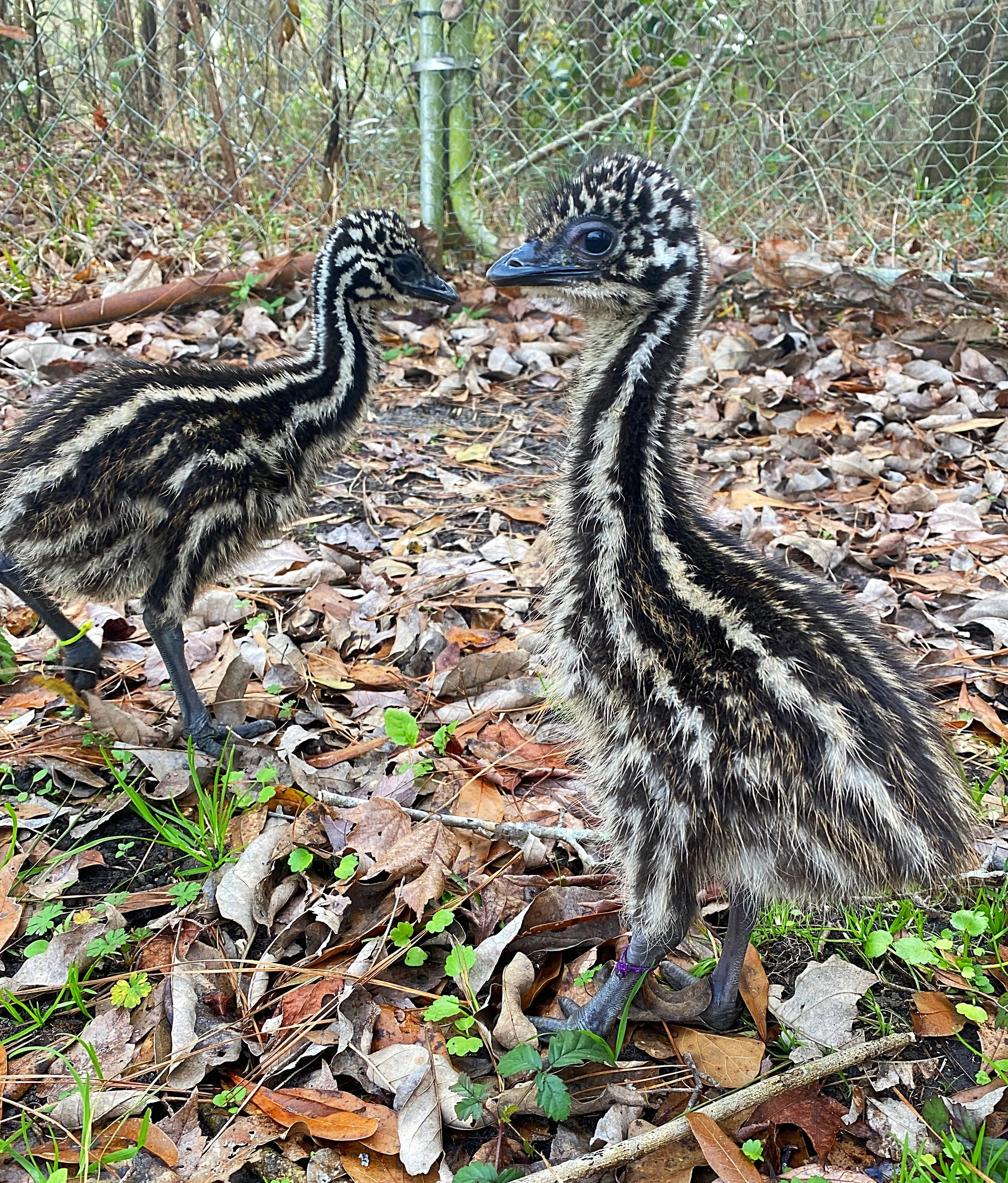
Emus, our sweet Thunder Chickens
-
How we started
In 2020 we drove over 700 miles to meet a person we were in contact with that had a variety of bloodlines of emus. We chose 2 DNA tested, from different bloodlines, 6 week old chicks. Then we drove the hundreds of miles back to our farm. To build a relationship with them, we hand fed the everyday for the next 3 years. We played games with them, petted them, and just spent time with them. We carefully blend their food to help them stay the healthiest possible. After 2 long years, we found 3 eggs. These were not fertile we discovered after 70 days in the incubator. We waited another 9 months for another egg. In 2023 we found 20 eggs given to us by our emus. We hatched our first emus in January 2024. Thus began our emu farm oddessy.
-
Emu Life
Emus are a dynamic large bird. They do grow to about 6 feet tall. As such, a six-foot fence is required for adults. Emus need a variety of foods. Adults do well with a blend of ratite pellets, rabbit pellets, and layer pellets. The chicks require a blend of ratite starter, chopped kale, and a variety of berries and fruit for them to explore. Ours love grapes, blueberries, and raspberries. Emus are a protective bird. they will patrol their pasture and keep predators out. This same instinct make them more complicated to blend other animals with them. Goats tend to eat their feathers. Ours does well with our alpaca. They do appreciate another emu with them. Emus can fight against each other, especially during the breeding season, winter. With care and attention, they can be very sweet birds. with their own little personalities. Please do your research before adding them to your farm.
-
Hatching
The vibrant dark green of an emu egg is very alluring. They weigh over a pound each. They are beautiful all on their own. Hatching one for yourself is a rewarding experience. They need a special incubator or a riser added to the Nurture Right 360, one of our favorite tabletop incubators. Etsy tends to have these available. It is best to hand turn an emu egg 3-5 times a day, odd numbers only, 180 degrees each time. They need the back and forth motion and not the constant one direction rolling. 97.5 temperature, 25-35% humidity. You can feel kicking after day 35. There is no lock down period for emu eggs. When you feel strong kicks and/or hear them whistle. Stop turning the egg and maintain temp and humidity. Ours have been hatching around day 50, but they can take 60 days or more. Please note the legs of the emu are fragile, the tendons can slip causing a lame bird. Extra caution must be taken to not allow them slip or slide on a smooth surface. Please take the time to do your research on emus before opting to try hatching. There is no guarantee on emu eggs if they are fertile or that they will hatch. This applies to about every egg. Follow us on social media, we love sharing our emus hatching.
Chick availability
Emu lay eggs very seasonally. We will be hatching eggs each year. We will have chicks available during that time. Chicks will leave the farm only when they are well started, eating well, and have good mobility. Usually after 2-3 weeks. Most often our chicks will be sexed. During the 2025 season we have been DNA testing all our chicks. Chick availability will be first come first serve. Use the button below to access our waitlist. Please note, we will email you when we plan on one being available. If we do not hear back from you within 24 hours, we will offer to the next person.
Meet our original breeding pair
Meet Bonnie and Clyde. Bonnie, our female emu is sitting in the front of this photo. Clyde, our male emu, is standing behind her. Clyde is the sweetest thing and follows me around everywhere. Both love to peck at anything shiny, as do most emus. Bonnie can be heard most of the day and night drumming like the drums from the Jumanji movie with the air sac in her chest. We just love that sound. It also is more prevalent during breeding season. At time you can hear Clyde grunting as well, it reminds me of a sound a bull gator makes. This pair allows us easily to gather the eggs the produce. We love our Bonnie and Clyde.



